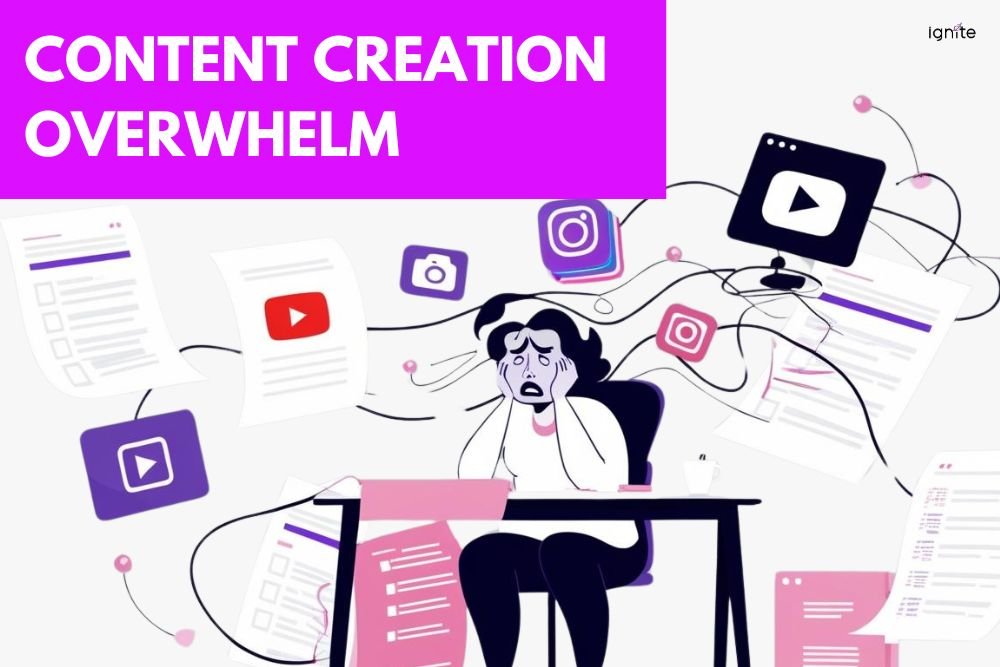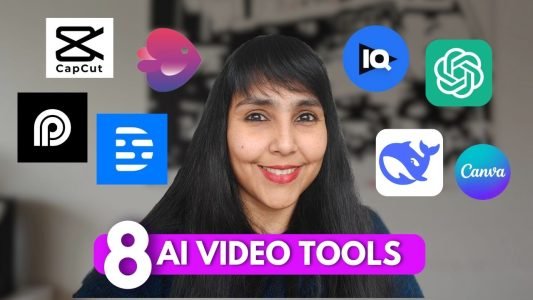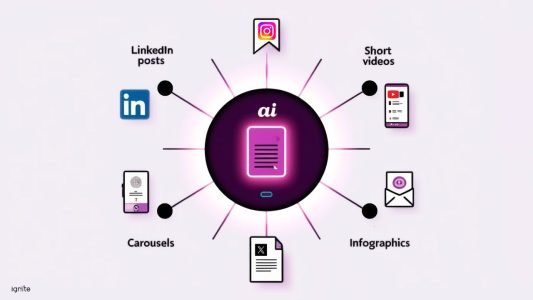Burnout isn’t just a buzzword; it’s a reality for countless content creators.
Whether you’re managing your personal brand, running a small business, or producing content as a full-time YouTuber, the demands of consistent creation can feel endless.
Between brainstorming, designing, editing, and publishing, you may find yourself drained before you even hit “post.”
For small business owners, content creators, and solo marketers, the sheer volume of tasks can quickly lead to overwhelm. But here’s the truth: it’s not just the amount of work—it’s the way you’re approaching it.
In this blog post, we’ll explore why content creation feels so overwhelming, the hidden costs of this stress, and actionable steps to simplify your workflow while reigniting your passion for creating.
Table of Contents
ToggleWhat makes content creation so overwhelming?
1. Managing too many platforms without a strategy
Every platform has its own set of rules. Instagram demands engaging visuals and short captions, YouTube thrives on long-form videos, and LinkedIn requires professional insights.
If you’re creating content for multiple platforms without a clear strategy, it’s easy to feel overwhelmed.
For example, posting the same long-form caption on Instagram that you use on LinkedIn might not resonate with your audience on either platform. Tailoring content without a plan can quickly drain your time and energy.2. Setting unrealistic deadlines
2. Setting unrealistic deadlines
Do you feel like you’re constantly racing against the clock? Many creators set rigid, self-imposed deadlines, often based on what competitors are doing.
This drive to keep up can lead to burnout when you realize your schedule is unsustainable. If you’ve ever told yourself, “I need to post daily to stay relevant,” you’ve likely experienced the stress that comes with trying to do too much.
2. Struggling with creative block
When every piece of content starts with a blank page, it’s no wonder you feel stuck. If you’re spending more time worrying about what to post than actually creating, you’re not alone.
The constant demand for fresh ideas can leave you mentally drained, especially when you don’t have tools or prompts to guide your brainstorming.
3. Doing too many things
Content creation isn’t the only thing on your plate.
You’re also managing your business, handling clients, and dealing with day-to-day responsibilities.
Content often gets pushed to the back burner, leaving you scrambling to produce something at the last minute. Without a plan, content creation feels like yet another item on an already overwhelming to-do list.
4. You’re setting the bar too high
Striving for high-quality content is great, but perfectionism can slow you down.
If you’re spending hours tweaking a single post, you’re adding unnecessary pressure to your workflow.
Over time, this constant push for perfection makes the process more stressful than it needs to be.
5. Not doing smart repurposing
If you’re constantly starting from scratch, you’re working harder, not smarter.
Repurposing allows you to maximize the value of each piece of content by adapting it for multiple formats.
However, simple repurposing isn’t enough. Strategic repurposing means intentionally creating content that can be adapted for multiple formats and platforms, maximizing its reach and impact.
7. Not using streamlined workflows
Without a workflow to guide your process, content creation becomes chaotic. You’re likely juggling multiple tasks at once—brainstorming ideas while editing videos, all while trying to keep up with posting schedules. This multitasking often leads to missed deadlines and low-quality content.
A workflow provides structure, breaking down your process into manageable steps. Instead of scrambling, you’ll know exactly what to do and when.
8. Not leveraging the right tools
Trying to manage everything manually is a fast track to frustration. Tasks like writing, designing, scheduling, and posting are repetitive and time-consuming if you don’t use tools to automate or simplify them. Without tools like AI for drafting or scheduling platforms for automation, you’re working harder than necessary.
What does this content chaos mean?
1. You’re missing opportunities for visibility
Inconsistent posting doesn’t just hurt your visibility—it costs you engagement and potential growth.
Algorithms reward consistency, so when you don’t show up regularly, your content is less likely to reach your audience. Missed opportunities pile up, making it harder to gain traction.
2. You’re wasting energy
Without a clear strategy, structure, or tools, even simple tasks can take hours. Instead of focusing on creativity, you end up spending time on repetitive or low-value activities or working on content that doesn’t align with your audience’s needs or your business goals.
Imagine spending hours on a video or blog post only to see little engagement because it didn’t resonate with your audience. That’s time and energy you can’t get back.
3. You’re burning out
If every content task feels like a grind, it’s a sign that you’re heading toward burnout. When you’re overwhelmed, it’s hard to stay motivated or creative.
Over time, you might even start resenting the process and lose the passion that got you started in the first place.
If this sounds like you, read on to see how you can take back control of your content and reduce the chaos and stress.
3 ways to take control of your content creation
Step 1: Build topical authority
Focus on creating content clusters around specific themes or topics relevant to your audience.
Know the audience’s pain points and create content from identifying their problem to giving them a solution.
Step 2: Use a content funnel
Structure your content using a funnel approach to guide your audience from awareness to action.
My 5E funnel (Empathy, Education, Expertise, Engagement, Excitement) helps you address their pain points, educate them, and inspire them to engage with your offers.
Create posts that empathize with your audience’s challenges (e.g., “Struggling to keep up with SEO?”) and gradually move them toward conversion-focused content (e.g., “Here’s how our tool saves you hours every week”).
Step 3: Use a clear workflow that simplifies your tasks
Establish a repeatable workflow to simplify and standardize your content creation process.
Start by evaluating your current workflow. Where are you spending too much time? Are there repetitive tasks that could be automated? Are you struggling with consistency? Identify the bottlenecks and inefficiencies that are holding you back.
Set up a basic workflow that organizes your process into clear steps:
- Plan: Brainstorm and outline your ideas for the month.
- Create: Focus on drafting, designing, and editing in batches.
- Publish: Use tools to schedule and monitor your posts.
This structure reduces decision fatigue and keeps you on track.
Use tools like Trello or Notion to manage your content calendar and assign specific days for each phase of the workflow (e.g., Mondays for ideation, Wednesdays for drafting, and Fridays for scheduling).
Step 4: Use tools and automation to work smarter
Leverage automation to save time and reduce manual effort on repetitive tasks like scheduling, posting, or formatting.
This frees up your time to focus on strategy and creativity. For example:
- Automate scheduling with platforms like Later or Hootsuite.
- Airtable to track and organize your content across platforms.
Step 5: Use AI to help at every stage
Incorporate AI tools to enhance efficiency throughout the content creation process.
For example:
- Use ChatGPT for creating strategies, writing blog drafts or captions, developing scripts, repurposing, and more.
- Canva for designing branded graphics
- DALL-E for generating unique visuals.
Ready to simplify your content creation?
Content creation doesn’t have to feel like an uphill battle. With the right systems and tools, you can transform your process, save time, and produce high-quality content that resonates with your audience.
Download my free 10x Content Efficiency Playbook to get over 75 tips on how to make your content process more productive and less stressful.







